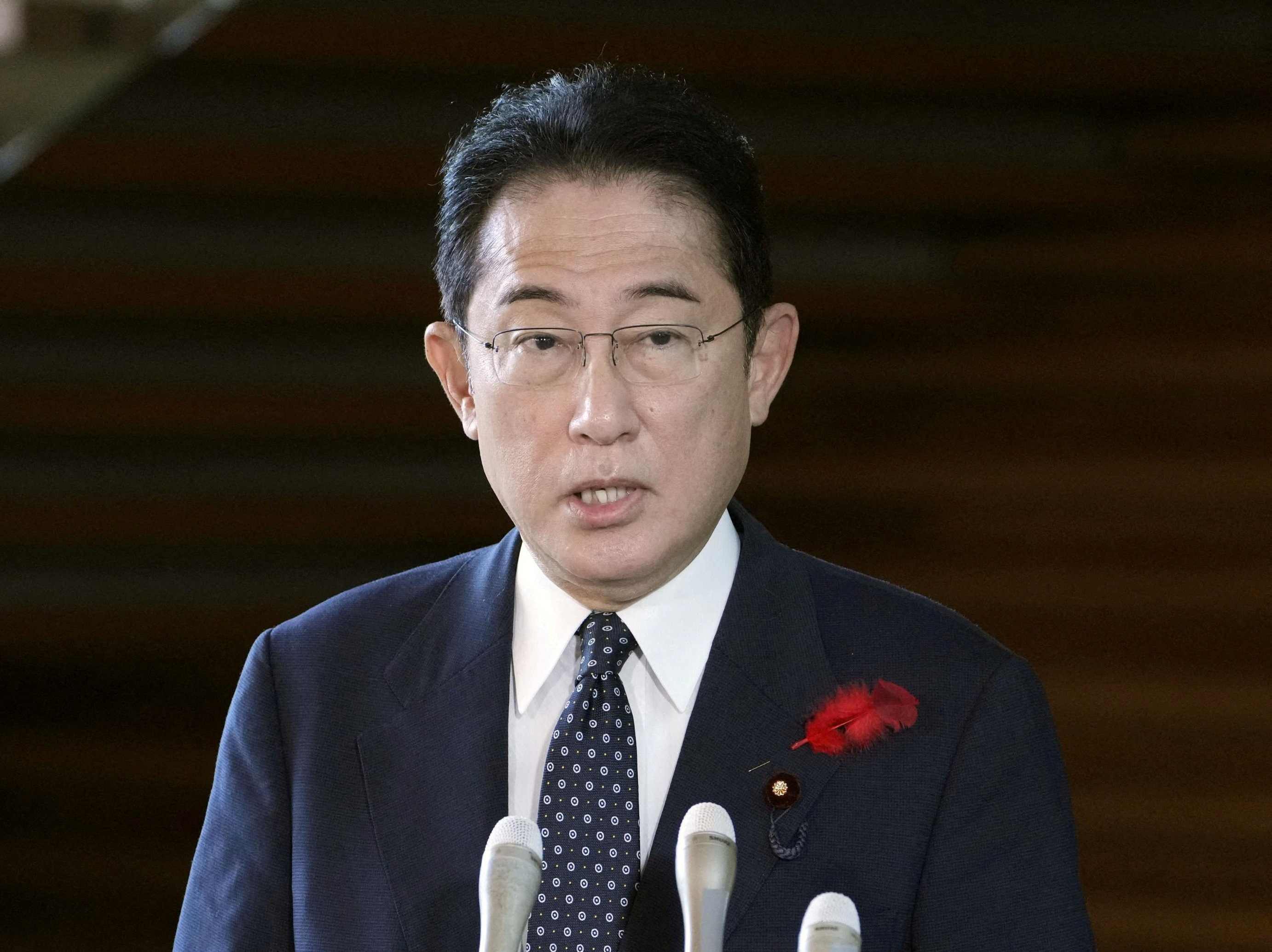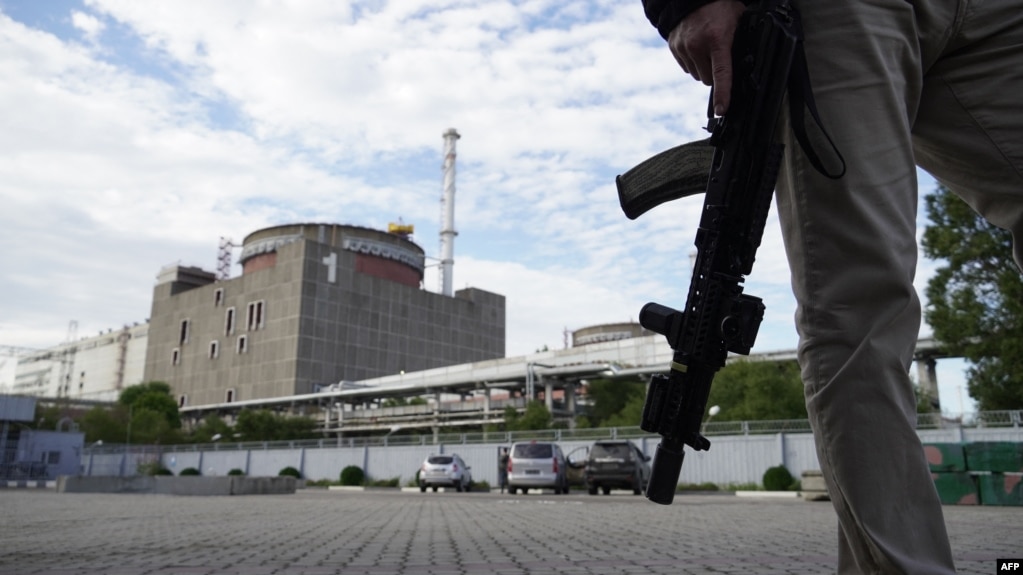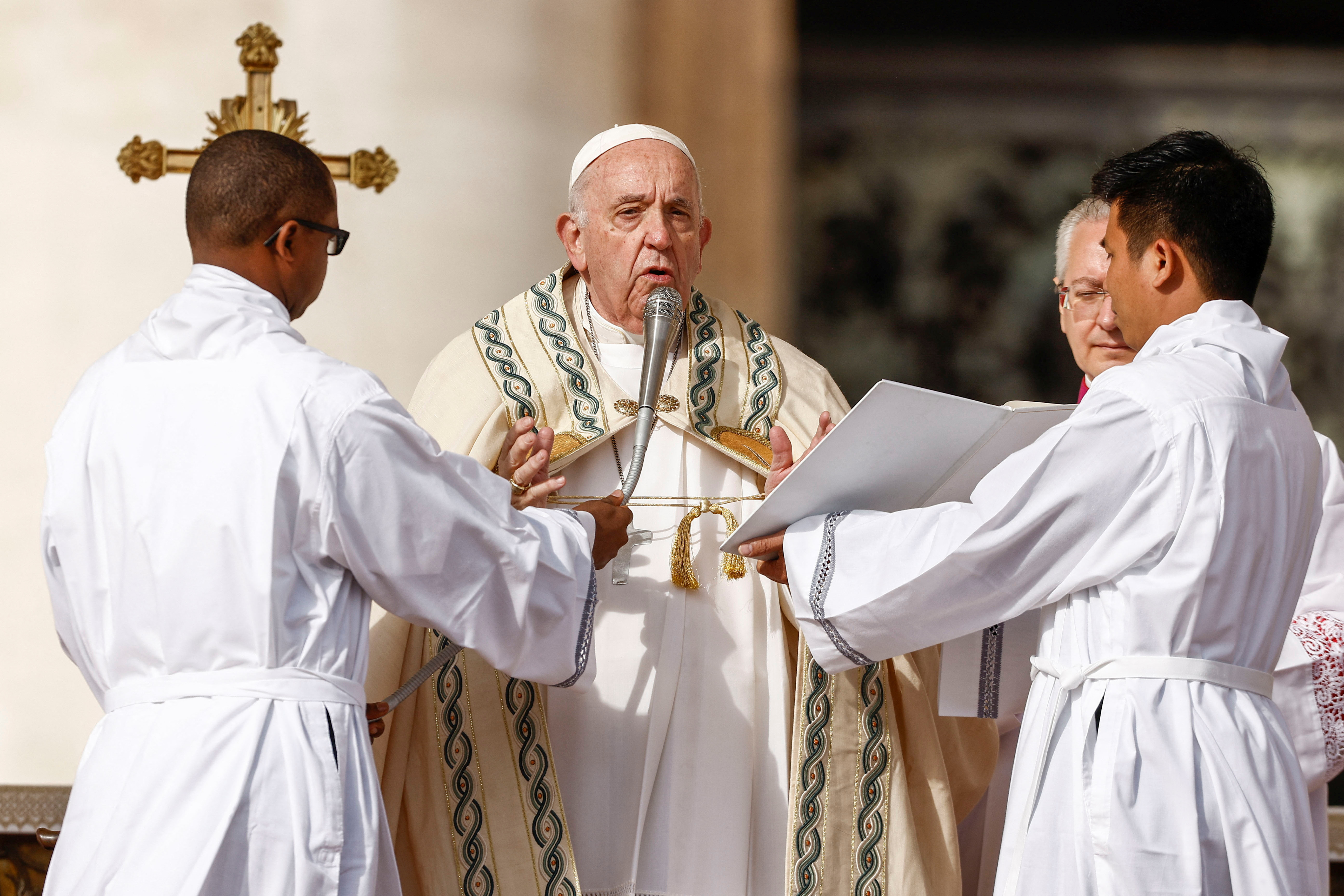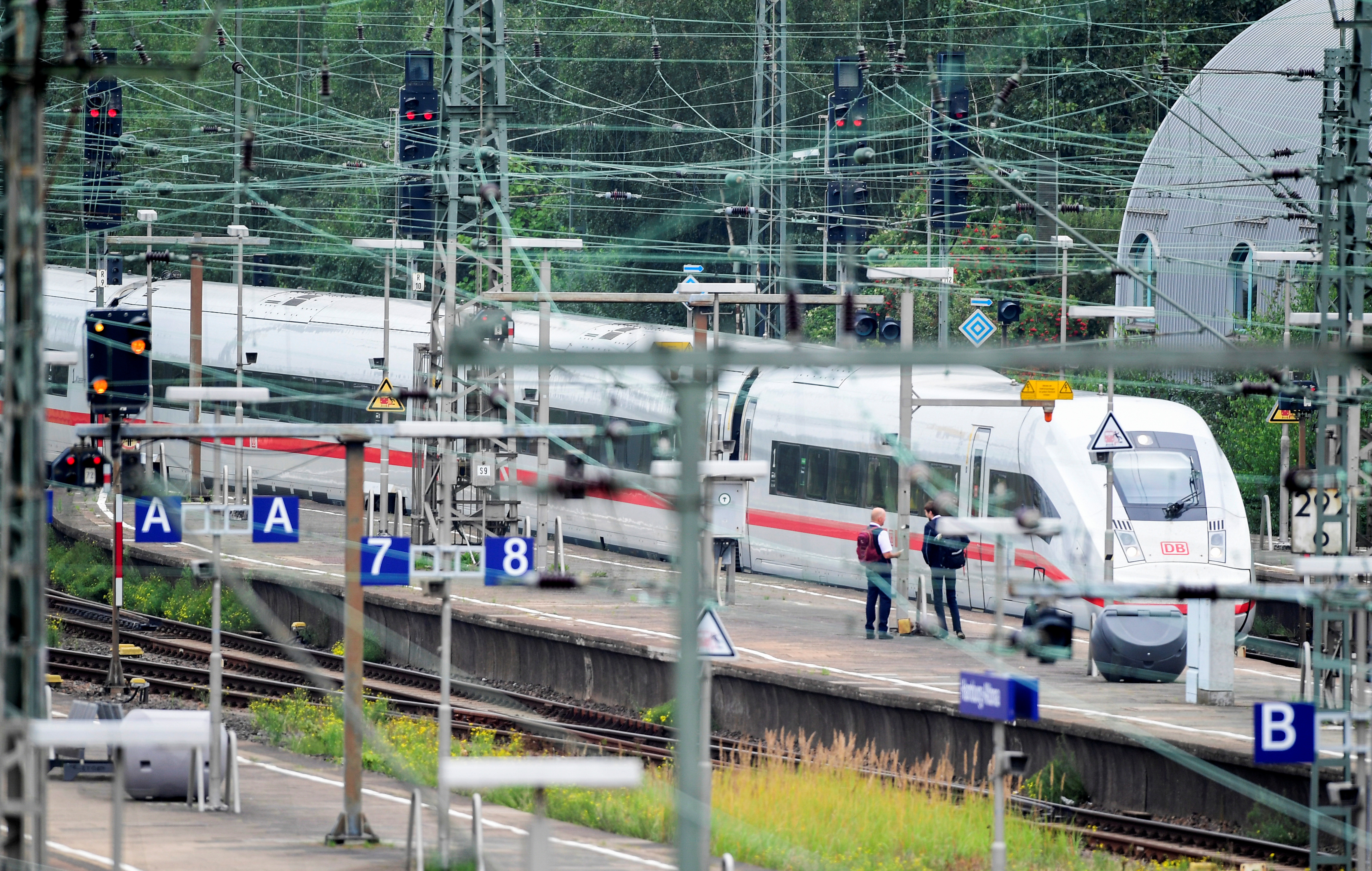Nuclear plant needs power supply to avoid meltdown
*
Overnight shelling brought down the main power line
*
Relying on emergency diesel generators for time being
*
IAEA says protection zone is an 'urgent imperative'
KYIV/VIENNA, Oct 8 (Reuters) -
Overnight shelling cut power to Ukraine's Russian-occupied Zaporizhzhia nuclear plant, which needs cooling to avoid a meltdown, forcing it to switch to emergency generators, Ukraine's state nuclear company and the U.N. atomic watchdog said on Saturday.
Even though the six reactors are shut down, they still need a constant supply of electricity to keep the nuclear fuel inside cool and prevent disaster.
Russia and Ukraine have blamed each other for shelling at the site of Europe's biggest nuclear plant that has damaged buildings and threatened a catastrophic nuclear accident. The International Atomic Energy Agency is pushing for a protection zone to be set up to prevent further shelling.
Speaking on BBC World News on Saturday, Petro Kotin, the head of Ukraine's state nuclear company Energoatom, warned the diesel generators only had a limited supply of fuel at present.
“Right now we are working on logistics to supply more fuel for these generators,” he said.
Energoatom did not immediately respond to a query on the status of negotiations with Russian authorities regarding fuel supply to the plant.
“If (the generators) run out of fuel, after that they will stop, and after that there will be a disaster...there will be a melting of the active core and a release of radioactivity from there,” Kotin said.
The nuclear plant is in a part of Zaporizhzhia region recently annexed by Russia, a move dismissed by Ukraine and its allies as an imperial landgrab.
In a decree published on Saturday, the Russian government set up a firm to take control of the plant, as ordered by President Vladimir Putin on Oct. 5.
The IAEA, which has two observers present at the plant, confirmed Energoatom's statement that the plant had switched to its diesel generators after shelling at around 1 a.m. cut the main 750 kilovolt line supplying external power to the plant.
"The resumption of shelling, hitting the plant's sole source of external power, is tremendously irresponsible. The Zaporizhzhia Nuclear Power Plant must be protected," the IAEA quoted its chief Rafael Grossi as saying in a statement.
"All the plant's safety systems continue to receive power and are operating normally, the IAEA experts (stationed at Zaporizhzhia) were informed by senior Ukrainian operating staff," the IAEA said.
Grossi has been in talks with Russia and Ukraine on setting up a protection zone around the plant, though he has declined to say what that would involve exactly or how it would be enforced or monitored. He was in Kyiv on Thursday and is due to go to Russia early next week.
"I will soon travel to the Russian Federation, and then return to Ukraine, to agree on a nuclear safety and security protection zone around the plant. This is an absolute and urgent imperative," the IAEA quoted Grossi as saying.
(Reporting by Max Hunder and Francois Murphy; Editing by Catherine Evans, Ros Russell and Nick Macfie)
EU Condemns Russia’s Takeover of Zaporizhzhia Nuclear Plant
FILE: A security person stands in front of the Zaporizhzhia nuclear power plant, amid the ongoing Russian military action in Ukraine, Sept. 11, 2022.
Share
The European Union’s top diplomat Saturday condemned “in the strongest possible terms” Russia’s attempt to annex the Zaporizhzhia nuclear power plant and said Russia’s forces must fully withdraw from the plant and return control of it to Ukraine.
High Representative for Foreign Affairs Josep Borrell called the seizure of the nuclear power plant “illegal, and legally null and void,” and said a reinforced International Atomic Energy Agency (IAEA) “presence at the site and its unhindered access to the plant are urgently needed in the interest of the security of Europe as a whole.”
Earlier in the day, the IAEA reported that the Zaporizhzhia plant, the biggest in Europe, had lost its only external power source as a result of renewed Russian shelling and was forced to rely on emergency diesel generators.
All six reactors at the plant are shut down, but they still require electricity for cooling and other safety functions. The IAEA said plant engineers have begun work to repair the damaged power line.
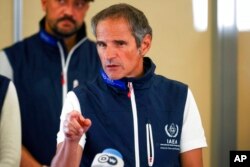
International Atomic Energy Agency Director General
Rafael Mariano Grossi speaks at a news conference at
Vienna Airport after his return from his mission at the
nuclear power plant of Zaporizhzhia in Ukraine, Sept. 2, 2022.
The nuclear watchdog agency said the plant’s link to a 750-kilovolt line was cut about 1 a.m. Saturday local time. It cited official information from Ukraine, as well as reports from IAEA experts at the site, which is held by Russian forces.
IAEA chief Rafael Grossi is traveling to Moscow to hold talks in the coming days about establishing a protection zone around the nuclear plant. He was in Ukraine Friday and met with President Volodymyr Zelenskyy regarding the situation. Transferring the plant to Russian ownership, Grossi said, is a violation of international law.
Russian shake-up?
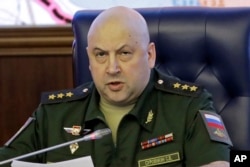
Colonel General Sergei Surovikin. Russia's Defense Ministry
announced Oct. 8, 2022, that Surovikin would be the commander
of all Russian troops fighting in Ukraine.
Russia's Defense Ministry named General Sergei Surovikin on Saturday as the new overall commander of Kremlin forces engaged in Ukraine. It was the first official announcement of a single overall commander for all Russian forces fighting in Ukraine since its February 24 invasion began.
"By the decision of the defense minister of the Russian Federation, General of the Army Sergei Surovikin has been appointed commander of the joint group of troops in the area of the special military operation," the statement said, using the Kremlin's term for the invasion of Ukraine.
Surovikin had since 2017 led Russia's Aerospace Forces. In June, he was placed in charge of Russian forces in southern Ukraine.
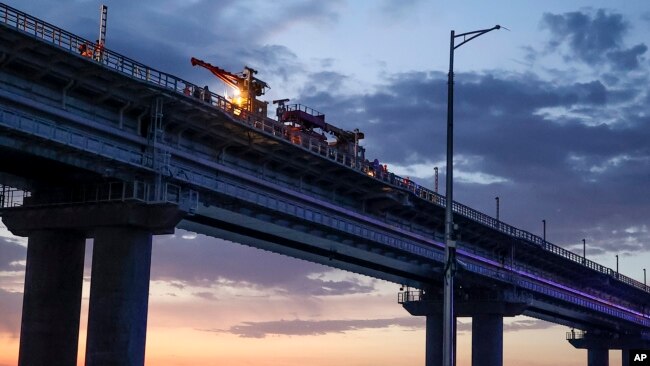
Workers repair the railway part of the Crimean bridge connecting
Russian mainland and Crimean Peninsula over the Kerch Strait, Oct. 8, 2022.
Bridge partly opens
Saturday dawned with an explosion that partially collapsed a bridge over the Kerch Strait, an important road and rail link between Russia and Crimea and a vital supply line for Russia’s war effort against Ukraine.
No one has claimed responsibility for the blast that killed three people and shut down the bridge. Russian transportation authorities said limited road and rail traffic had resumed about 10 hours after the attack.
Zelenskyy, in a video address, indirectly acknowledged the bridge attack but not its cause.
“Today was not a bad day and mostly sunny on our state's territory,” he said. “Unfortunately, it was cloudy in Crimea. Although it was also warm.”
Ukrainian officials have repeatedly threatened to strike the bridge.
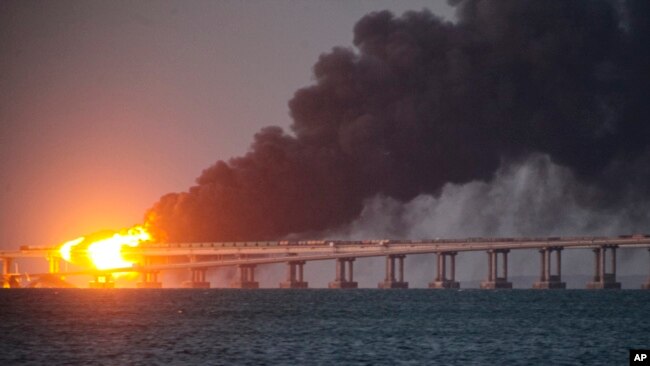
Flame and smoke rise from Crimean Bridge connecting Russian
mainland and Crimean Peninsula over the Kerch Strait, Oct. 8, 2022.
Moscow stopped short of assigning blame, but the speaker of Crimea’s Kremlin-backed regional parliament accused Ukraine, while downplaying the severity of the damage.
“Now they have something to be proud of: over 23 years of their management, they didn’t manage to build anything worthy of attention in Crimea, but they’ve managed to damage the surface of the Russian bridge,” Vladimir Konstantinov, chairperson of the State Council of the Republic, wrote on Telegram.
The official Twitter account of the Ukraine government tweeted, “Sick burn.”
Mykhailo Podolyak, a Zelenskyy adviser, lauded the attack, tweeting, "Crimea, the bridge, the beginning. Everything illegal must be destroyed, everything stolen must be returned to Ukraine, everything occupied by Russia must be expelled."
Russian Foreign Ministry representative Maria Zakharova wrote on Telegram, “The Kiev regime’s reaction to the destruction of civilian infrastructure highlights its terrorist nature.”
The Ukrainian postal service announced it would issue stamps commemorating the blast, saying in a statement that the images would draw on classic film posters to highlight the bridge's “sacred significance” to Moscow. The postal service previously released a set of stamps commemorating the sinking of the Moskva, a Russian flagship cruiser, by a Ukrainian strike in late May.
Investigation ongoing
The blast, reportedly a truck bomb, occurred even though all vehicles driving across it undergo automatic checks for explosives by state-of-the-art control systems. That has drawn a stream of critical comments from Russian war bloggers.
The truck was owned by a resident of the Krasnodar region in southern Russia, Russia’s Investigative Committee said. It noted that investigators arrived at his home as part of the inquiry and are looking at the truck’s route and other details.
The 19-kilometer bridge across the Kerch Strait linking the Black Sea and the Sea of Azov opened in 2018 and is the longest in Europe. The $3.6 billion project is a tangible symbol of Moscow’s claims on Crimea, and it has provided an essential link to the peninsula, which Russia annexed from Ukraine in 2014.
While Russia seized areas north of Crimea early on during the invasion and built a land corridor to it along the Sea of Azov, Ukraine is pressing a counteroffensive to reclaim them.
Some information for this story came from The Associated Press and Reuters.
Factbox-The bridge linking Russia to the Crimean peninsula
Yesterday
LONDON (Reuters) - The road-and-rail bridge linking Russia and the Crimean peninsula was damaged in a powerful blast on Saturday, hitting a crucial supply route for Russian forces in Ukraine. Following are key facts about the bridge.

A helicopter drops water to extinguish fuel tanks ablaze on the Kerch bridge in the Kerch Strait, Crimea
© Reuters/STRINGER
CRIMEA AND RUSSIA LINK
The 19-km (12-mile) Crimea Bridge over the Kerch Strait is the only direct link between the transport network of Russia and the Crimean peninsula, which Moscow annexed from Ukraine in 2014.
The bridge was a flagship project for Russian President Vladimir Putin, who opened it himself for road traffic with great fanfare by driving a truck across in 2018.
It consists of a separate roadway and railway, both supported by concrete stilts, which give way to a wider span held by steel arches at the point where ships pass between the Black Sea and the smaller Azov Sea.
The structure was built, at a reported cost of $3.6 billion, by a firm belonging to Arkady Rotenberg, a close ally and former judo partner of Putin.
Related video: Why is the Crimean Bridge attack significant?
WHY IT MATTERS
The bridge is crucial for the supply of fuel, food and other products to Crimea, where the port of Sevastopol is the historic home base of Russia's Black Sea Fleet.
It also became a major supply route for Russian forces after Moscow invaded Ukraine on Feb. 24, sending forces from Crimea to seize most of southern Ukraine's Kherson region and some of the adjoining Zaporizhzhia province.
Russia's Defence Ministry said on Saturday that those troops could be fully supplied by existing land and sea routes.
WHAT HAS BEEN DESTROYED
The blast on Saturday brought down sections of road taking traffic in one direction.
Traffic was initially suspended after the incident but by Saturday evening cars and buses were allowed to start crossing the bridge in alternating directions on the remaining intact lanes, while heavy goods vehicles waited to cross by ferry.
Russian officials said railway traffic would resume on Saturday evening.
The span through which ships pass the strait was not damaged.
(Reporting by Reuters; Editing by Kevin Liffey and Frances Kerry)
